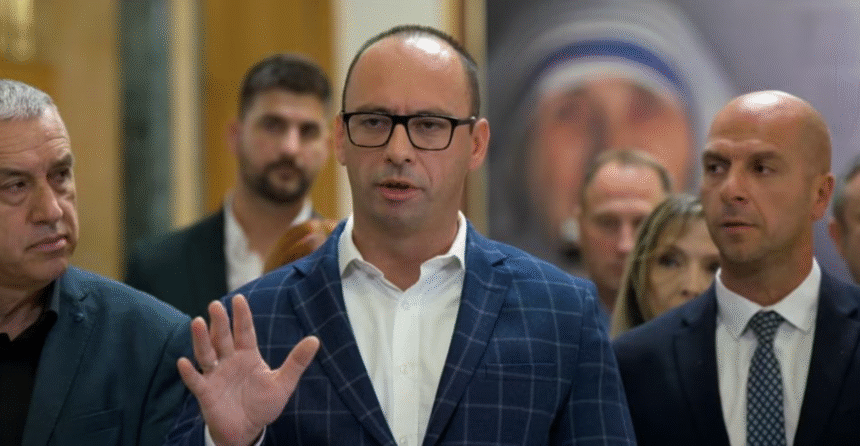From being an instrument for integrating the Serb community into Kosovo’s society, the Serb List has turned into a driver of its disintegration.
That is how Belgzim Kamberi, from the NGO Musine Kokalari Institute for Social Policies in Pristina, views the political trajectory of the Serb List.
Only after the local elections scheduled for October 12, he says, will it become clear whether the party has shifted its positions and policies.
For now, according to Kamberi, it remains uncertain whether this Belgrade-backed party – the largest representing Kosovo Serbs – will contribute to strengthening stability and coexistence, or whether it will continue pursuing a destructive policy that fosters mistrust.
On the other hand, Miodrag Miliqević of the NGO Aktiv in North Mitrovica believes that the Serb List has already lost its credibility and ability to form coalitions, and that this would not change even with internal reshuffles.
He stresses that this situation is largely the result of the armed attack in Banjska in 2023, but also of the party’s inconsistent “hot-and-cold” approach.
Responsibility for the Banjska attack was claimed by the then-vice chairman of the Serb List, Milan Radoičić.
The Serb List never issued a statement regarding this attack – in which a Kosovo police officer was killed, along with three Serb gunmen in the ensuing clashes – nor did it distance itself from Radoičić, whom it had consistently defended until then.
In November 2022, the party withdrew from Kosovo’s institutions in the north, citing the government’s decision to replace Serbian-issued license plates with Kosovo ones.
Later, in April 2023, it called for a boycott of local elections and subsequently for a boycott of votes to replace Albanian mayors in Serb-majority municipalities.
As a result, Albanian mayors – rejected by the local Serb population – remained in power in North Mitrovica, Zvečan, Leposavić, and Zubin Potok until the end of their mandates.
Nevertheless, the Serb List eventually rejoined the electoral process.
Currently, it holds nine seats in the Kosovo Assembly and will also participate in the upcoming October 12 local elections.
Just last week, it appealed to Kosovo’s Constitutional Court, claiming that the Serb community’s nominee for deputy speaker of the Assembly had not been voted on together with the candidate representing non-Serb minorities.
Assembly Speaker Dimal Basha closed the constitutive session on August 30 without the election of the Serb deputy speaker.
Is the “Rehabilitation” of the Serb List Possible?
Radio Free Europe asked the Serb List whether it faced difficulties functioning within Kosovo’s institutions, and whether it intended to change its policies or internal structures, but received no reply.
Following the Assembly session last week, the party’s MP Igor Simić said that the rights of the Serb community were being violated, along with the constitutional order and the Assembly’s Rules of Procedure.
“The Serb List and the Serb people are not an obstacle, nor anyone who wishes to block processes. We simply demand that our rights be respected,” Simić said.
Speaking to Radio Free Europe, Kamberi noted that the Banjska attack raised doubts about the Serb List, and that the party’s new leadership under Zlatan Elek has not significantly changed the situation.
“We will see how the Serb List behaves once it regains local power [in northern Kosovo], and what kind of relationship it will have with official Pristina… Its positions will also depend on the dialogue process, as well as developments in Serbia. If the SNS [Serbian Progressive Party] remains in power, we will see what it advises the Serb List. If the government changes, it remains to be seen whether it will support the Serb List’s concept or that of another political party,” Kamberi said.
Miliqević does not believe that internal changes within the Serb List can positively influence its credibility.
He argues that political parties must find a compromise to elect the deputy speaker from the Serb community, in order to resolve the current deadlock.
“It is difficult to expect any rebranding of the Serb List, but at the same time, it makes no sense to reject voting for people who are not directly responsible for certain events. If the argument is still based on who was seen with whom in photos, or who met whom for a coffee… then know that such stories do not belong in the Assembly,” Miliqević assessed.
After months of institutional deadlock, Kosovo’s Assembly speaker was finally elected at the end of August, but the problem persisted with the election of the Serb deputy speaker.
Since the Serb List refused to replace its candidate, Slavko Simić, who failed to secure enough votes in three rounds of voting, Speaker Basha decided to determine a new nominee by drawing lots.
However, no other Serb candidate secured sufficient votes either, leading Basha to close the constitutive session.
Kosovo’s Presidency later announced that it is conducting an “analysis” of the Assembly’s constitutive process, and that President Vjosa Osmani will act in accordance with the Constitution and applicable laws, with the aim of ensuring institutional stability and upholding the will of Kosovo’s citizens.







